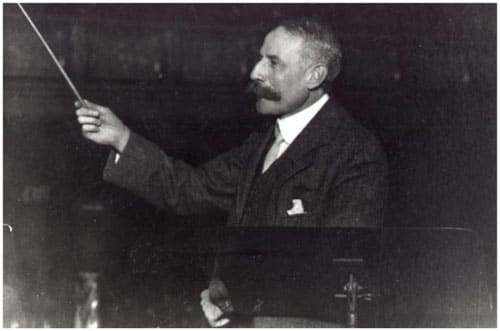
A 1964 BBC Symphony Orchestra performance of Elgar’s Symphony No.2, conducted by Sir Malcolm Sargent, has recently been issued on CD
Killing two birds with one stone, as it were, Sir Thomas Beecham once described Karajan as ‘like Malcolm Sargent, only musical’. There’s a moment at the end of a BBC Symphony Orchestra performance of Elgar’s Second Symphony where Sargent achieves a breathtaking, Karajan-like gradation of dynamics.
Sargent never recorded this work commercially but the June issue of the BBC Music magazine had, as its covermount disc, a live performance given at Colston Hall, Bristol, in 1964. At that time the orchestra’s principal conductor was Dorati – so it was a change from playing the Miraculous Mandarin Suite! (Sir Malcolm Sargent was chief conductor at the Proms from 1947 until his death from cancer in 1967. Any English person asked to name a famous conductor would, in those days, have said ‘Malcolm Sargent’.)
I saw him conduct twice in London and remember with gratitude many of his broadcast orchestral performances, although his reputation became tarnished since he was allegedly difficult to work with. Few Sargent recordings remain, although Elgar’s Dream of Gerontius, coupled with Tortelier’s first recording of the Cello Concerto, is still on Testament.
The Elgar Second opens unpromisingly in cramped mono sound. At first hearing the slow movement stands out, the scherzo even more – it sounds as if a lot of rehearsal time went into it. Sargent brought something quite unique to this dark symphony, even if (one feels) he was too knowingly aware of the passages that would stir his listeners: there’s one particularly underlined ritenuto in the first movement.
Overall perhaps he hasn’t the grasp you found with Boult, especially in the wartime BBC SO recording made for EMI, reissued by Beulah. Nor did he quite find the ‘nobilmente’ element that came so spontaneously to Barbirolli. But his freer approach to pacing and the emotional temperature of both the funeral march and (even more) the commotion stirred in the middle of the scherzo mark him as a significant interpreter.
At the end of June, 200 copies of the CD were in stock at the magazine’s back issues department (0870 444 7014). It’s an interpretation no true Elgarian should miss and there’s likeable annotation by David Nice.
Christopher Breunig






